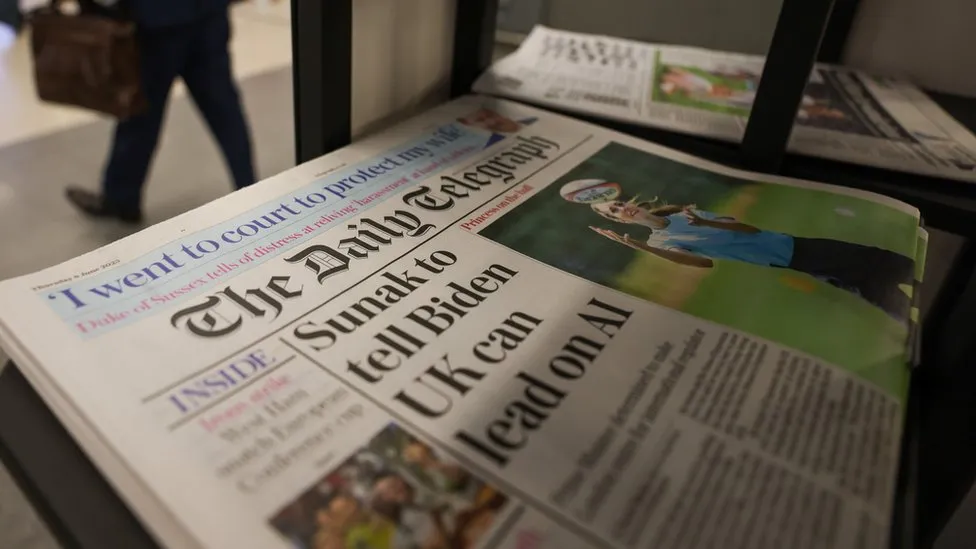The bidder for the Daily and Sunday Telegraph, sponsored by Abu Dhabi, has declared that journalists will have complete editorial autonomy.
The files were scheduled to be turned over to the RedBird IMI consortium, which was supported by the Gulf.
However, the government stepped in due to concerns that an autocratic foreign state may obtain control over the papers.
The bid’s leader, Jeff Zucker, told the BBC that his promises were supported by enforceable contracts.
The former CNN executive continued, “An independent editorial trust board will further protect the Telegraph’s editorial independence.”
The bid is predominantly financed by Sheikh Mansour bin Zayed bin Sultan al-Nahyan, the vice president and deputy prime minister of the United Arab Emirates (UAE) in addition to being the owner of Manchester City Football Club.
Mr. Zucker maintains that the UAE will continue to be a “passive investor,” with no say over editorial choices, even if it is supplying 75% of the funding.
MPs, a number of the Telegraph’s current and past journalists, and its readers have expressed serious worries that the publication could end up in the hands of an oppressive foreign regime.
However, Mr. Zucker emphasized that his investment company would be a responsible owner of the titles. If the sale is approved, Mr. Zucker will take over as chief executive of the Telegraph and Spectator.
The Telegraph and the Spectator magazines were taken over by Lloyds Banking Group last year after their long-time owners, the Barclay family, failed to repay a loan totaling over £1 billion. The publications were then put up for sale.
Lloyds started an auction procedure, but the Barclay family used funds given by Sheikh Mansour bin Zayed al-Nahyan to settle their debt at the eleventh hour.
The Barclay family consented to give Redbird IMI, a joint venture between RedBird Capital, a US company, and International Media Investments (IMI), an Abu Dhabi-based company run by Mr. Zucker, ownership of the Telegraph and Spectator in exchange.
At that moment, a Public Interest Intervention Notice was issued by the UK government to take action.
The government steps in to stop Abu Dhabi from purchasing Telegraph
Speaking about the reason Redbird IMI had not joined the published auction process like the other bidders, Mr. Zucker stated he had hoped for assurance that his group’s offer would seal the purchase.
The fact that we were able to outsmart some of our rivals doesn’t imply that there was anything unscrupulous about our actions. It only indicates that we were somewhat more astute,” he continued.
In Britain, The Daily and Sunday Telegraph are very influential, especially among conservative politicians and people.
A classic joke made by Boris Johnson when he was prime minister was that The Daily Telegraph “is my real boss”.
Prominent Conservatives, such as longtime Tory MP David Davis, have voiced serious concerns about the proposed takeover. Davis stated: “The UAE is an authoritarian regime with a pretty dismal human-rights record.” Its officials are unfit to oversee our media.”
A proposal to find more bidders and lower Abu Dhabi’s shareholding to a level below controlling interest was one alternative put up by those with knowledge of the negotiations.
Nevertheless, the prospective purchasers declined this.
Mr. Zucker maintained that his proposal was “led by Americans” and that the suggested arrangement would protect the newspapers’ autonomy.
“We are confident that our commitments and the incredibly robust legally underpinned editorial protections that we have submitted will be sufficient to address any concerns,” he said.
Redbird IMI’s promises of editorial security hinge on the creation of an editorial trust board.
According to Mr. Zucker, the board will have three responsibilities: resolving any conflicts that may develop, approving the nomination of editors, and guaranteeing the editorial independence of the titles.
“I think that taken collectively, there’s no UK newspaper that has stronger protections of editorial independence,” he stated.
Mr. Zucker stated that Chris Evans, the Telegraph’s current editor, will remain in his position, even though he acknowledged he had not yet had that discussion with Mr. Evans.
Although the government may also send the situation to the Competition and Markets Authority, ownership of the daily might remain unclear during a crucial election campaign period, making the transfer of power far from definite and perhaps taking months.
In recent years, the Gulf states have made substantial investments in the United Kingdom. Investors from the UAE are being courted to invest in a new nuclear power station at Sizewell in Suffolk. These investors have already invested billions of dollars into ports, housing developments, windfarms, and scientific parks. If the Conservative government takes a stance against its preferred publications, it might potentially anger wealthy allies.
Opponents of the agreement, however, cite instances of violations of press freedom, such as rumors of a mass firing of writers at IMI-owned Al Roeya, a newspaper in Dubai, after its editors chose to publish an article about the high cost of petrol in the United Arab Emirates.
“We are fully committed to the editorial independence of the Telegraph and the Spectator,” an IMI spokeswoman stated. A separate independent Editorial Trust to act as a guardian, an additional undertaking from IMI to not engage in any way with journalists or their reporting, and the structural separation in the Redbird IMI fund buying the Telegraph and Spectator are the legal undertakings we are making to the UK government to protect the journalistic freedom of the titles. We will not be involved in the management of either the Telegraph or the Spectator; this is purely a business investment.”
Lucy Frazer, the Culture and Media Secretary, will finally decide whether to approve it, demand more assurances or changes, or simply refuse it.
Commenting was rejected by the Department of Culture, Media, and Sport.
According to information provided to the BBC, the government and Ofcom received the ideas more than a week ago, and a preliminary decision is anticipated in February.

